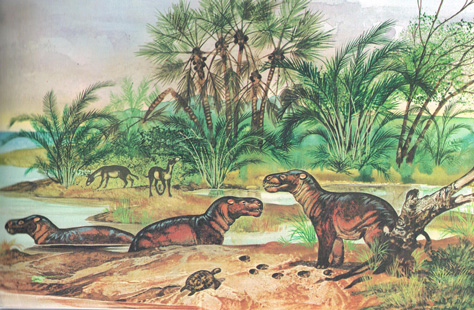New Research Suggests Ever Increasing Atmospheric CO2 Could Take Mankind Back 56 Million Years
Scientists Warn That Rising CO2 Levels Could Take the UK Back to the Palaeogene
New research, published in the academic journal “Nature Geoscience”, suggests that unless our species is able to mitigate the current level of carbon dioxide emissions, Western Europe and New Zealand could experience a climate not seen in those parts of the world since the Palaeogene geological period. The study, led by scientists from Bristol University, warns that Western Europe and New Zealand could revert to the tropical “greenhouse” climate of the early Palaeogene which persisted from 56 to 48 million years ago.
The heat wave that much of the UK has experienced this summer could become the norm for Western Europe, putting a huge burden on agriculture and public services. A “hot house” Earth could lead to more extinctions and fundamentally change parts of the world, making human habitation very challenging.
Tropical Jungle and Rainforest
The early Palaeogene is a period of great interest to climate change scientists as carbon dioxide levels (around 1,000 ppmv) are similar to those predicted by climate change models for the end of this century.
Typical Tropical Vegetation of the Palaeogene Period

Picture credit: Bristol University
A Return to the Palaeogene Geological Period
Lead author of the research, Dr David Naafs (School of Earth Sciences, Bristol University) commented:
“We know that the early Palaeogene was characterised by a greenhouse climate with elevated carbon dioxide levels. Most of the existing estimates of temperatures from this period are from the ocean, not the land, what this study attempts to answer is exactly how warm it got on land during this period.”
Estimating Terrestrial Land Temperatures 50 Million Years in the Past
The research team used molecular fossils of microorganisms preserved in ancient peat (lignite), to assess the land temperature some 50 million-years ago. The scientists demonstrated that annual land temperatures in Western Europe as well as New Zealand were actually higher than previously thought, between 23 and 29 °Celsius, this is currently 10 to 15 °C higher than current average temperatures in these parts of the world.
These results suggest that temperatures similar to those of the current heat wave that is influencing western Europe and other regions would become the new normal by the end of this century, if CO2 levels in the atmosphere continue to increase.
Co-author of the report, Professor Rich Pancost (Director of the University of Bristol Cabot Institute), added:
“Our work adds to the evidence for a very hot climate under potential end-of-century carbon dioxide levels. Importantly, we also study how the Earth system responded to that warmth. For example, this and other hot time periods were associated with evidence for arid conditions and extreme rainfall events.”
London Approximately 50 Million in the Past – A Tropical Environment

Picture credit: BBC/John Barber
Terrestrial Mid-latitudes During the Palaeogene Geological Period
The research team will now turn their attentions to geographical areas in lower-latitudes to see just how hot terrestrial environments got in Palaeogene. One of the questions the team wish to answer was summed by Dr Naafs, who said:
“Did the tropics, for example, become ecological dead zones because temperatures in excess of 40 °C were too high for most form of life to survive? Some climate models suggest this, but we currently lack critical data. Our results hint at the possibility that the tropics, like the mid-latitudes, were hotter than present, but more work is needed to quantify temperatures from these regions.”
The scientific paper: “High Temperatures in the Terrestrial Mid-latitudes During the Early Palaeogene” by B. D. A. Naafs, M. Rohrssen, G. N. Inglis, O. Lähteenoja, S. J. Feakins, M. E. Collinson, E. M. Kennedy, P. K. Singh, M. P. Singh, D. J. Lunt and R. D. Pancost published in the journal Nature Geoscience.
Everything Dinosaur acknowledges the assistance of a press release from Bristol University in the compilation of this article.
Visit the award-winning Everything Dinosaur website: Everything Dinosaur.

